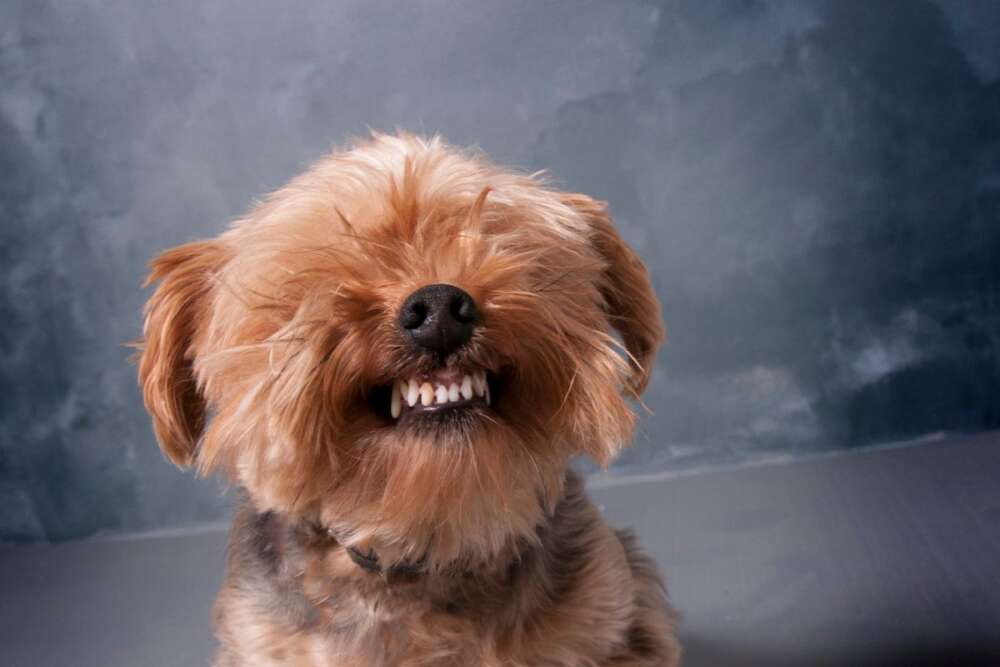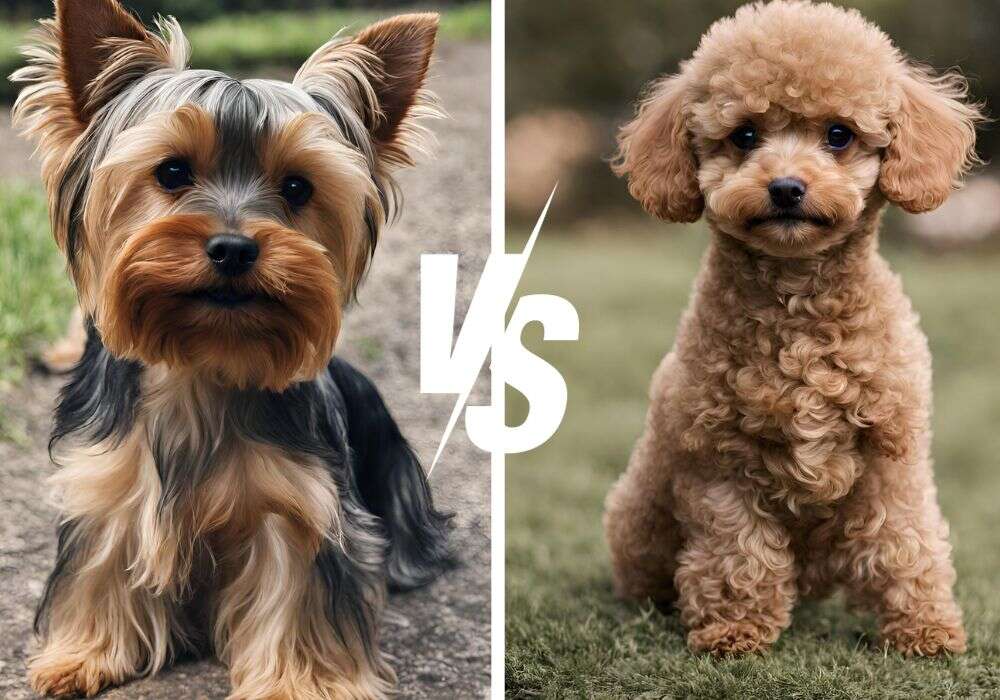Introduction
Yorkshire Terriers and Toy Poodles are two popular breeds of dogs that are often compared to each other. Both breeds are small, affectionate, and intelligent, but there are some key differences between them. In this article, we will compare Yorkies and Toy Poodles in terms of size, temperament, grooming, health, training, cost, and where to buy. We will also provide some tips on choosing the right breed for your family.
Table With Breed Comparison Data
| Aspect | Yorkie | Toy Poodle |
|---|---|---|
| Size | ||
| Temperament | ||
| Lifespan | ||
| Shedding & Allergies | ||
| Maintenance | ||
| Training Needs | ||
| Exercise Needs |
Yorkie vs Toy Poodle: Size
Yorkies are typically 8-10 inches tall and weigh 4-6 pounds. They are small dogs with long, silky coats that come in a variety of colors.
Toy Poodles are also small dogs, but they are slightly larger than Yorkies. They typically measure 10-12 inches tall and weigh 6-8 pounds. They have curly coats that come in a variety of colors.
Yorkie vs Toy Poodle: Temperament
Both Yorkies and Toy Poodles are friendly, intelligent, and affectionate dogs. However, there are some key differences in their temperaments that you should be aware of before deciding which breed is right for you.
Yorkies are known for being more assertive and independent than Toy Poodles. They can be a bit more difficult to train, and they may be more likely to bark at strangers or other animals. Toy Poodles, on the other hand, are typically more easy-going and adaptable. They are often eager to please and learn new tricks, and they are less likely to be aggressive.
Ultimately, the best way to determine which breed is right for you is to meet both Yorkies and Toy Poodles in person. Spend some time with each breed to see which one you feel the most comfortable with.
Yorkie vs Toy Poodle: Grooming
Both Yorkies and Toy Poodles are relatively low-maintenance breeds when it comes to grooming. However, there are a few key differences in their grooming needs that you should be aware of.
Yorkies have a long, silky coat that requires regular brushing to prevent matting and tangles. You should brush your Yorkie’s coat at least once a day, and more often if they are shedding heavily. You should also bathe your Yorkie every few weeks, or as needed.
Toy Poodles also have a long coat, but it is more curly than the Yorkie’s coat. This means that Toy Poodles are more prone to matting and tangles, so they require more frequent brushing. You should brush your Toy Poodle’s coat at least twice a day, and more often if they are shedding heavily. You should also bathe your Toy Poodle every few weeks, or as needed.
In addition to brushing and bathing, both Yorkies and Toy Poodles will need their nails trimmed regularly. You should also clean their ears and brush their teeth to prevent dental disease.
Overall, both Yorkies and Toy Poodles are relatively easy to groom, but there are a few key differences in their grooming needs that you should be aware of.
Yorkie vs Toy Poodle: Health
Both the Yorkshire Terrier and the Toy Poodle are generally healthy breeds, but there are some specific health conditions that they are more prone to than other breeds.
Yorkshire Terrier health problems:
- Lung disease
- Heart disease
- Eye problems
- Skin problems
- Dental problems
Toy Poodle health problems:
- Allergies
- Hip dysplasia
- Epilepsy
- Eye problems
- Heart disease
It is important to be aware of these potential health problems so that you can take steps to prevent or manage them. By working with your veterinarian, you can help your Yorkie or Toy Poodle live a long and healthy life.
Training
Both Yorkies and Toy Poodles are intelligent breeds that are relatively easy to train. However, there are some key differences in their training needs that you should be aware of.
Yorkies are known for being stubborn and independent, so they can be a challenge to train. However, they are also very eager to please their owners, so with patience and consistency, you can usually train a Yorkie to behave well.
Yorkies are also very responsive to positive reinforcement, so using treats and praise as rewards can be very effective in training them.
Toy Poodles are generally easier to train than Yorkies. They are eager to please and learn new things, and they are less likely to be stubborn or independent.
Toy Poodles are also very responsive to positive reinforcement, so using treats and praise as rewards can be very effective in training them.
Overall, both Yorkies and Toy Poodles are trainable breeds, but there are some key differences in their training needs that you should be aware of.</p
Cost
Both Yorkies and Toy Poodles are relatively expensive breeds of dogs. The average price of a Yorkie puppy from a reputable breeder is between $1,000 and $2,000. Toy Poodles can cost even more, with the average price of a puppy from a reputable breeder being around $2,500.
There are a few factors that can affect the cost of a Yorkie or Toy Poodle puppy, including:
- The breeder’s reputation
- The puppy’s lineage
- The puppy’s color
Before buying a Yorkie or Toy Poodle puppy, it’s crucial to do your homework and choose a reliable breeder. Any breeder worth their salt will be willing to disclose any known health issues with the dog and provide a health guarantee.
In addition to the initial purchase price, you should also factor in the cost of food, veterinary care, grooming, and training when considering whether a Yorkie or Toy Poodle is the right breed of dog for you.
Food: A Yorkie or Toy Poodle will need to eat a high-quality diet of dog food. The cost of food will vary depending on the brand of food you choose, but you can expect to spend around $20-$30 per month on food for a small dog.
Vet care: Despite their robust health, even toy breeds like Yorkies and Toy Poodles may become sick sometimes. Depending on the services required, veterinarian care for a small dog might cost anywhere from $500 year to $1,000 annually.
Grooming: Yorkies and Toy Poodles both have long, silky coats that require regular grooming. The cost of grooming will vary depending on the groomer you use, but you can expect to spend around $50-$100 per month on grooming for a small dog.
Training: Yorkies and Toy Poodles are both intelligent breeds of dogs, but they can also be stubborn. The cost of training will vary depending on the type of training you choose, but you can expect to spend around $100-$200 per month on training for a small dog.
Overall, the cost of owning a Yorkie or Toy Poodle can range from $500-$1,500 per year. However, the cost of owning a dog is not just about the initial purchase price. You also need to factor in the cost of food, veterinary care, grooming, and training. By considering all of these factors, you can make an informed decision about whether a Yorkie or Toy Poodle is the right breed of dog for you.
Where to Buy
You can find Yorkies and Toy Poodles for sale at a variety of places, including:
- Pet stores: Pet stores often carry a variety of purebred dogs, including Yorkies and Toy Poodles.
- Breeders: Breeders specialize in breeding specific breeds of dogs, and they can often provide you with more information about the breed and its history.
- Rescue organizations: Rescue organizations often have Yorkies and Toy Poodles available for adoption.
When choosing a place to buy a Yorkie or Toy Poodle, it is important to do your research and make sure that you are dealing with a reputable breeder or organization. You should also be prepared to pay a higher price for a dog from a reputable breeder.
Here are some tips for finding a reputable breeder or organization:
- Ask for references from other people who have purchased dogs from the breeder or organization.
- Visit the breeder or organization in person and meet the dogs and their parents.
- Ask the breeder or organization about their health testing and breeding practices.
By following these tips, you can increase your chances of finding a healthy and happy Yorkie or Toy Poodle.
Conclusion
Comparing Yorkies with Toy Poodles, it’s essential to understand their grooming and care differences. While Yorkies might benefit from yorkie costumes for style, Toy Poodles might need different attire. For grooming, using a yorkie tail docking length guide can be helpful for Yorkies. Additionally, knowing about yorkie dental care is important for maintaining their overall health.
Yorkies are smaller and more delicate than Toy Poodles. They also tend to be more vocal and alert. Toy Poodles, on the other hand, are larger and more sturdy. They are also typically calmer and more laid-back.
Ultimately, the best dog for you depends on your individual needs and preferences. If you are looking for a small, active dog that is good with children, a Yorkie may be a good choice for you. If you are looking for a larger, more laid-back dog that is good for first-time dog owners, a Toy Poodle may be a better option.
FAQs
1. Which breed is more suitable for families with kids?
Both breeds are kid-friendly, but Toy Poodles are often more patient with younger children. However, it’s essential to supervise interactions and teach children how to approach and touch dogs to ensure mutual respect.
2. How often do these breeds need grooming?
Yorkies have a long, fine coat that requires regular brushing and grooming to prevent mats and tangles, while Toy Poodles have curly hair that needs consistent grooming, usually every 4-6 weeks, to keep it in top shape and avoid matting.
3. Are they apartment-friendly dogs?
Yes, both the Yorkie and the Toy Poodle adapt well to apartment living due to their small size. They don’t need a lot of space but do require regular exercise and mental stimulation.
4. Which breed is easier to train?
Toy Poodles are highly intelligent and often easier to train, whereas Yorkies can be a bit more independent. However, with consistent training methods, both breeds can learn commands and tricks effectively.

As a lifelong dog lover, I fell in love with Yorkies for their spunky personalities, intelligence, and unwavering loyalty.
As a dedicated Yorkie owner, I have spent years learning about the breed and how to provide the best possible care for them. From finding the proper diet to exercise, and so much more! I take every aspect of my Yorkie’s life seriously.
In addition to being a loving dog parent, I’m an avid blogger, sharing my experiences and insights on all things Yorkie-related. From training tips to grooming advice, Yorkieclothing.com is a go-to resource for other Yorkie owners worldwide.




